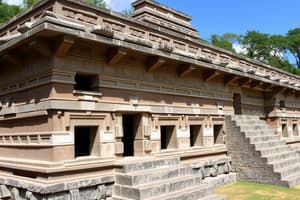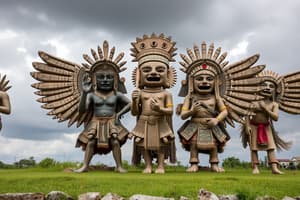Podcast
Questions and Answers
The Templo Mayor in Tenochtitlán was a significant ________ structure.
The Templo Mayor in Tenochtitlán was a significant ________ structure.
religious
Warfare was an integral part of Aztec ________.
Warfare was an integral part of Aztec ________.
culture
Aztec soldiers were trained from ________.
Aztec soldiers were trained from ________.
adolescence
Maize cultivation was crucial for Aztec ________.
Maize cultivation was crucial for Aztec ________.
The Aztecs introduced crops like tomatoes, chili peppers, and ________.
The Aztecs introduced crops like tomatoes, chili peppers, and ________.
Understanding the complexities of Aztec society enhances our appreciation for its unique ________.
Understanding the complexities of Aztec society enhances our appreciation for its unique ________.
The Aztec civilization is known for its significant achievements in various fields, including religion, society, art, ______, education, and warfare.
The Aztec civilization is known for its significant achievements in various fields, including religion, society, art, ______, education, and warfare.
Huitzilopochtli was the Aztec patron god associated with the sun, fire, and ______ victory.
Huitzilopochtli was the Aztec patron god associated with the sun, fire, and ______ victory.
Aztec society was organized hierarchically, with rulers at the top and ______ at the bottom.
Aztec society was organized hierarchically, with rulers at the top and ______ at the bottom.
Aztec architecture was characterized by grand pyramids used for temples and ______ for both residential and civic structures.
Aztec architecture was characterized by grand pyramids used for temples and ______ for both residential and civic structures.
Nobles in Aztec society held high social status due to their noble lineage, while craftsmen, merchants, farmers, and ______ occupied lower positions.
Nobles in Aztec society held high social status due to their noble lineage, while craftsmen, merchants, farmers, and ______ occupied lower positions.
The Aztecs established one of the most powerful empires in pre-Columbian America known for achievements in religion, society, art, ______, education, and warfare.
The Aztecs established one of the most powerful empires in pre-Columbian America known for achievements in religion, society, art, ______, education, and warfare.
Flashcards are hidden until you start studying
Study Notes
Aztec Civilization
The Aztecs were an indigenous people of central Mexico who established one of the most powerful empires in pre-Columbian America. Their civilization is known for its significant achievements in various fields, including religion, society, art, architecture, education, and warfare. In this article, we will explore these aspects of the Aztec civilization.
Religion
Religion played a crucial role in the daily life of the Aztecs. They believed in multiple gods, each with specific responsibilities and domains. For example, Huitzilopochtli was their patron god, associated with the sun, fire, and military victory. Their religious practices included human sacrifices, which have been misunderstood by some Westerners. These offerings served dual purposes: to honor deities and maintain cosmic balance.
Society
Society was organized hierarchically, with rulers at the top and commoners at the bottom. Nobles held high social status due to their noble lineage, while craftsmen, merchants, farmers, and slaves occupied lower positions. This hierarchy extended into the family structure, where fathers ruled over families and individuals had different rights based on gender, age, and marital status.
Architecture
Aztec architecture was characterized by grand pyramids used for temples and platforms for both residential and civic structures. These buildings often displayed advanced engineering techniques, such as interlocking stones without mortar and multi-level constructions. Some notable examples include the Templo Mayor in Tenochtitlán and the Great Pyramid of Cholula.
Warfare
Warfare was an integral part of Aztec culture. Despite having peaceful intentions when expanding their territory, they did not hesitate to engage in battles when necessary. Soldiers were trained from adolescence, and warriors could earn considerable prestige within society. Victors would also take prisoners, offering them to their gods through sacrifice.
Agriculture
Agriculture was another critical aspect of the Aztec civilization. They relied heavily on maize cultivation, often using irrigation systems to enhance crop growth. Their agricultural methods allowed them to sustain a large population during periods of drought. Additionally, they introduced crops like tomatoes, chili peppers, avocados, squash, cacao beans, pumpkins, beans, and maguey.
In conclusion, the Aztec civilization displays remarkable advancements across various dimensions, from their intricate religious beliefs to societal norms, architectural prowess, military strategies, and agricultural practices. Understanding these facets provides insight into the complexities of this ancient society and enhances our appreciation for its unique heritage.
Studying That Suits You
Use AI to generate personalized quizzes and flashcards to suit your learning preferences.




